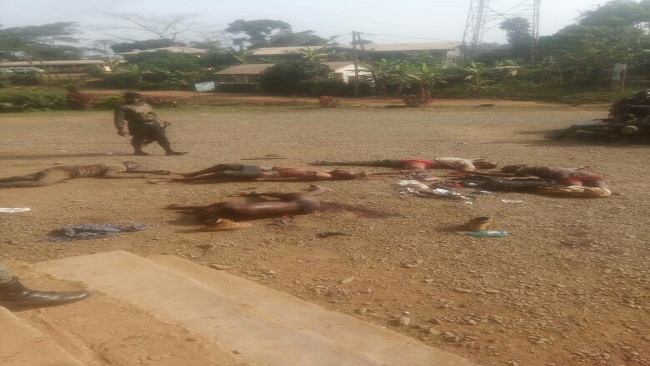Genocide in Southern Cameroons: Biya presenting an image of a righteous strict leader to the international community
President Paul Biya’s used of extensive patronage and nepotism has for ages undermined formal institutions and presently plunge Cameroon into a civil war scenario. The invincibility of Mr. Biya has shrouded Cameroonians in fear; a dictator ruling with the personalism once only characterized by infamous dictators such as the Ugandan thug, Idi Amin. No country in the world has had their internal and foreign relations so personalized like Cameroon. And for 35 years Paul Biya remains one of the most unfathomably merciless tyrants in African history.
Biya’s personal rule is as distinctive a political system as any other; just without recourse to parliament or institutions. To be sure, the Biya Francophone regime is characterized by a leadership that does not respond to public demands and does not use democratic feedback to direct government action. However, the last 14 months have been witness to its gradual demise-the Southern Cameroons crisis.
The CPDM regime in Yaoundé has made a mockery of all the so-called prominent Anglophone political and military leaders. Frankly speaking, the Biya administration is a government determined not by the public or citizens but by those allied with him as a leader; dependent on a patron-client relationship, most often characterized by his family members including his Beti-Ewondo kinsmen and women.
The system of personal rule in Cameroon has been structured by French Cameroun CPDM politicians themselves rather than the institutions that are recognized in good governance. With no institutions to work within, the use of violence and coercion is accepted because there are no established rules and referees beyond the CPDM ruler. The 84-year-old Paul Biya is exploiting this whilst and creating an image of rectitude.
Biya is a brutal omnipresent leader but he makes sure he presents an image of a righteous strict leader to the international community. Prior to the Southern Cameroons genocide, he ensured a strong relation with the Vatican, the European Union and the United Nations. Back in Cameroon, he announced fake measures to resolve the Anglophone problem coupled with massive public service recruitment and he pushed CRTV cameras to refocus on infrastructural development.
Biya promised every Cameroonian student a computer laptop and he has now become a ubiquitous leader with sites being named for him, laptops and exhibitions entirely devoted to him and his wife Chantal Biya. He has developed a personality cult an image of a ‘French Cameroun Man’ that allows him to win the admiration of Francophones and ensure control. This type of rule allows Mr. Paul Biya to tip-toe the line between prophetic ruler and tyrant making sure that fear quelled coups if his forces did not.
The sustained personal authoritarian rule of Mr. Paul Biya is enabling his regime to withstand challenges that may have lead to transitions were it not. His relationship with foreign nations most importantly France allows for domestic patronage networks to be fuelled. Authoritarian regimes in Francophone Africa have been privy to a relative lack of foreign intervention when it comes to human rights unlike elsewhere in the world due to this patron-client relationship. It happened in the Ivory Coast because Laurent Gbagbo was moving away from Paris. As result tyrannical rulers in French Africa such as in Togo, Gabon, Congo, Cameroon, and Congo-Kinshasa including Chad have survived compared to their counterparts elsewhere. This type of relationship binds followers to leaders, with a recognized understanding of inequality. It also lends to loyalty, necessary for the leaders prolonged presence. Biya regime is proof that brutality may not necessarily lead to a government’s demise but work to ensure its survival. Biya guarantees loyalty due to corrupt and extensive patrimonial networks that lead to few constraints in the application of force.
As an all-imposing leader Biya has the ability to focus the attentions of his military underlings on his wishes and interests. Personal rule is characterized by a love for power, and this is the case for Cameroon and the 84-year-old Paul Biya. It was Biya’s shrewdness and loyalty to ruthlessness under the late Ahmadou Ahidjo that allowed for him to rise from relative obscurity to holding the most important positions in the country.
Biya’s rise to power was rife with manipulation backed by the French, perseverance and merciless brutality against the North and entirely orchestrated in an unprecedented manner. Paul Biya’s personal rule is inherent in his independence through coercion and brute force; his tyrannical rule fitting almost comically within the realms of the theory of personal rule.
By Soter Tarh Agbaw-Ebai





